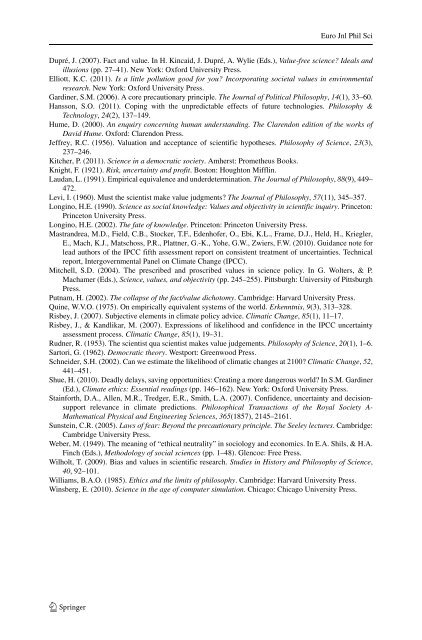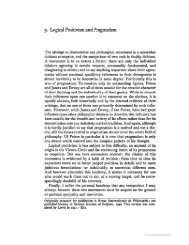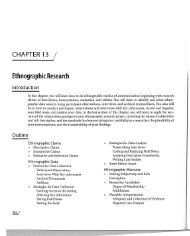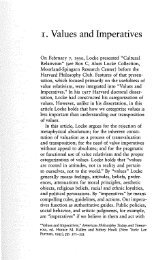In defence of the value free ideal
In defence of the value free ideal
In defence of the value free ideal
- No tags were found...
Create successful ePaper yourself
Turn your PDF publications into a flip-book with our unique Google optimized e-Paper software.
EuroJnlPhilSciDupré, J. (2007). Fact and <strong>value</strong>. <strong>In</strong> H. Kincaid, J. Dupré, A. Wylie (Eds.), Value-<strong>free</strong> science? Ideals andillusions (pp. 27–41). New York: Oxford University Press.Elliott, K.C. (2011). Is a little pollution good for you? <strong>In</strong>corporating societal <strong>value</strong>s in environmentalresearch. New York: Oxford University Press.Gardiner, S.M. (2006). A core precautionary principle. The Journal <strong>of</strong> Political Philosophy, 14(1), 33–60.Hansson, S.O. (2011). Coping with <strong>the</strong> unpredictable effects <strong>of</strong> future technologies. Philosophy &Technology, 24(2), 137–149.Hume, D. (2000). An enquiry concerning human understanding. The Clarendon edition <strong>of</strong> <strong>the</strong> works <strong>of</strong>David Hume. Oxford: Clarendon Press.Jeffrey, R.C. (1956). Valuation and acceptance <strong>of</strong> scientific hypo<strong>the</strong>ses. Philosophy <strong>of</strong> Science, 23(3),237–246.Kitcher, P. (2011). Science in a democratic society. Amherst: Prome<strong>the</strong>us Books.Knight, F. (1921). Risk, uncertainty and pr<strong>of</strong>it. Boston: Houghton Mifflin.Laudan, L. (1991). Empirical equivalence and underdetermination. The Journal <strong>of</strong> Philosophy, 88(9), 449–472.Levi, I. (1960). Must <strong>the</strong> scientist make <strong>value</strong> judgments? The Journal <strong>of</strong> Philosophy, 57(11), 345–357.Longino, H.E. (1990). Science as social knowledge: Values and objectivity in scientific inquiry. Princeton:Princeton University Press.Longino, H.E. (2002). The fate <strong>of</strong> knowledge. Princeton: Princeton University Press.Mastrandrea, M.D., Field, C.B., Stocker, T.F., Edenh<strong>of</strong>er, O., Ebi, K.L., Frame, D.J., Held, H., Kriegler,E., Mach, K.J., Matschoss, P.R., Plattner, G.-K., Yohe, G.W., Zwiers, F.W. (2010). Guidance note forlead authors <strong>of</strong> <strong>the</strong> IPCC fifth assessment report on consistent treatment <strong>of</strong> uncertainties. Technicalreport, <strong>In</strong>tergovernmental Panel on Climate Change (IPCC).Mitchell, S.D. (2004). The prescribed and proscribed <strong>value</strong>s in science policy. <strong>In</strong> G. Wolters, & P.Machamer (Eds.), Science, <strong>value</strong>s, and objectivity (pp. 245–255). Pittsburgh: University <strong>of</strong> PittsburghPress.Putnam, H. (2002). The collapse <strong>of</strong> <strong>the</strong> fact/<strong>value</strong> dichotomy. Cambridge: Harvard University Press.Quine, W.V.O. (1975). On empirically equivalent systems <strong>of</strong> <strong>the</strong> world. Erkenntnis, 9(3), 313–328.Risbey, J. (2007). Subjective elements in climate policy advice. Climatic Change, 85(1), 11–17.Risbey, J., & Kandlikar, M. (2007). Expressions <strong>of</strong> likelihood and confidence in <strong>the</strong> IPCC uncertaintyassessment process. Climatic Change, 85(1), 19–31.Rudner, R. (1953). The scientist qua scientist makes <strong>value</strong> judgements. Philosophy <strong>of</strong> Science, 20(1), 1–6.Sartori, G. (1962). Democratic <strong>the</strong>ory. Westport: Greenwood Press.Schneider, S.H. (2002). Can we estimate <strong>the</strong> likelihood <strong>of</strong> climatic changes at 2100? Climatic Change, 52,441–451.Shue, H. (2010). Deadly delays, saving opportunities: Creating a more dangerous world? <strong>In</strong> S.M. Gardiner(Ed.), Climate ethics: Essential readings (pp. 146–162). New York: Oxford University Press.Stainforth, D.A., Allen, M.R., Tredger, E.R., Smith, L.A. (2007). Confidence, uncertainty and decisionsupportrelevance in climate predictions. Philosophical Transactions <strong>of</strong> <strong>the</strong> Royal Society A-Ma<strong>the</strong>matical Physical and Engineering Sciences, 365(1857), 2145–2161.Sunstein, C.R. (2005). Laws <strong>of</strong> fear: Beyond <strong>the</strong> precautionary principle. The Seeley lectures. Cambridge:Cambridge University Press.Weber, M. (1949). The meaning <strong>of</strong> “ethical neutrality” in sociology and economics. <strong>In</strong> E.A. Shils, & H.A.Finch (Eds.), Methodology <strong>of</strong> social sciences (pp. 1–48). Glencoe: Free Press.Wilholt, T. (2009). Bias and <strong>value</strong>s in scientific research. Studies in History and Philosophy <strong>of</strong> Science,40, 92–101.Williams, B.A.O. (1985). Ethics and <strong>the</strong> limits <strong>of</strong> philosophy. Cambridge: Harvard University Press.Winsberg, E. (2010). Science in <strong>the</strong> age <strong>of</strong> computer simulation. Chicago: Chicago University Press.






